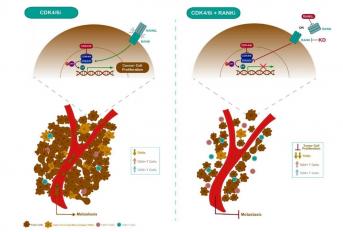Associação Portuguesa de Investigação em Cancro
RANK pathway inhibition sensitizes triple-negative breast cancer to CDK4/6 inhibitors and enhances immune response
RANK pathway inhibition sensitizes triple-negative breast cancer to CDK4/6 inhibitors and enhances immune response

This study, led by Sandra Casimiro and Luis Costa from the Oncology Translational Lab at GIMM CARE, part of the GIMM Foundation – Gulbenkian Institute for Molecular Medicine, demonstrates the potential efficacy of a novel therapeutic strategy for triple-negative breast cancer (TNBC) — an aggressive form of breast cancer for which treatment options are largely limited to chemotherapy. Genetic or pharmacological inhibition of the RANK receptor, which is associated with poor prognosis in TNBC, sensitized tumor cells to CDK4/6 inhibitors — drugs that show limited efficacy as monotherapy in this cancer subtype — and effectively halted tumor growth in animal models. Moreover, this combination therapy triggered an anti-tumor immune response. These results pave the way for clinical studies in patients with triple-negative breast cancer and may also be applicable to other breast cancer subtypes or solid tumors. The study was published in Molecular Cancer Therapeutics, a journal of the prestigious American Association for Cancer Research (AACR).
Authors and Affiliations:
Inês Gomes1,ⱡ<, Maria Martelo1,ⱡ, Rúben D. Vilela1,ⱡ, María Jiménez2, Eva M. Trinidad3, Jorge Gomez-Miragaya3, Eva González-Suárez2,3, Érica Martins1, Sofia S. Torres4, Patrícia Corredeira1, Joana L. Miranda1, André Mansinho1,4,5, Sofia Torres6, Catarina Abreu4,6, Rita Sousa4,6, Sandra Casimiro1,4,# and Luis Costa1,4,6,#
1. Oncology Translational Laboratory, GIMM - Gulbenkian Institute for Molecular Medicine, Lisbon, Portugal.
2. Spanish National Cancer Research Centre (CNIO), Madrid, Spain.
3. Oncobell, Bellvitge Biomedical Research Institute, IDIBELL, Barcelona, Spain.
4. Faculty of Medicine, University of Lisbon, Lisbon, Portugal.
5. START Lisbon, Local Health Unit of Santa Maria, Lisbon, Portugal.
6. Oncology Division, Local Health Unit of Santa Maria, Lisbon, Portugal
ⱡThese authors contributed equally to this work
#Co-senior authors
Abstract:
Despite chemotherapy's limitations and toxic effects, it remains the primary treatment for most triple-negative breast cancer (TNBC) patients, with or without immune checkpoint inhibitors (ICI). While cyclin-dependent kinase 4/6 inhibitors (CDK4/6i) combined with endocrine therapy have revolutionized luminal BC treatment, CDK4/6i alone are largely ineffective in TNBC, even with functional retinoblastoma protein (pRB). Activation of the receptor activator of nuclear factor-κB (RANK) pathway has been associated with poor prognosis in TNBC and with resistance to CDK4/6i in luminal BC, effects that can be reversed by RANK ligand inhibitors (RANKLi). In this study, we analyzed the effect of RANK knockdown (KD) or RANKLi in the response of pRB-proficient TNBC to CDK4/6i in vitro. RANK+ patient-derived xenograft (PDX) and cell line-derived xenograft models were used to assess therapeutic efficacy of CDK4/6i + RANKLi in vivo. Two syngeneic models of TNBC and luminal BC were used to portrait the main therapy-induced alterations in the tumor immune microenvironment. RANK KD or RANKLi sensitized pRB-proficient TNBC cells to CDK4/6i in vitro. The combination of palbociclib and RANKLi regressed or prevented tumor growth and metastasis in vivo, enhancing cell cycle arrest. Both CDK4/6i and RANKLi elicited an anti-tumor immune response, characterized by an increase in CD4+ and CD8+ T cells and a decrease in tumor-associated macrophage’s (TAMs) infiltrating the tumor microenvironment. These findings suggest that combining CDK4/6i and RANKLi could offer a new therapeutic strategy for pRB-proficient TNBC, holding potential immunomodulatory benefits across BC subtypes.
Journal: Molecular Cancer Therapeutics




